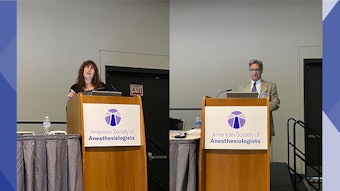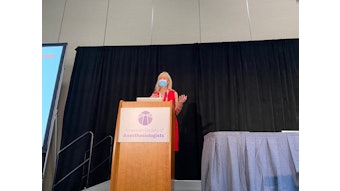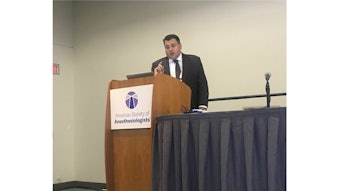COVID-19 impact on airway management
COVID-19 creates big challenges for airway management.

COVID-19 has ushered in many changes in airway management, chief among them the struggle to achieve a delicate balance between provider and patient safety.
The learning curve for this new challenge has been rapid and steep, according to Michael F. Aziz, MD, Professor of Anesthesiology and Perioperative Medicine at Oregon Health and Science University in Portland. Dr. Aziz was a presenter at the 2021 session “COVID and the Changed Landscape of Airway Management and Education.”
“COVID-19 has elevated the level of PPE now considered for airway management and has advanced our drive to understand what results in the aerosolization of the virus during airway management,” Dr. Aziz said. “Some of the changes we’ve experienced will be lasting, while science has already challenged some of our early assumptions.”
According to co-presenter Tracey Straker, MD, MPH, MS, FASA, Professor of Anesthesiology at Albert Einstein College of Medicine in New York, there are clear impacts to resident training, provider infection, and safe airway management as a result of COVID-19. Specifically, Dr. Straker said the pandemic affected basic airway management skills such as bag mask ventilation and skills in direct laryngoscopy, and resulted in a superficial understanding of the practice of using succinylcholine.
However, the experience also yielded a silver lining by advancing technology, with opportunities to perform airway management via videolaryngoscopy and robotics.
“Unfortunately, the educational experience has suffered because of COVID-19, with virtual learning versus in-person and the absence of hands-on simulation. Fundamental airway management skills have decreased in residency, too,” Dr. Straker said. “Fortunately, the use of PPE has increased for all general anesthetics. That and the discerning use of videolaryngoscopy need to continue.”
Dr. Aziz agreed and said the continued use of PPE will benefit anesthesiologists when dealing with future aerosolized respiratory infections. This is particularly important for residents whose exposure to airway management experiences has diminished due to reductions in elective surgery volume.
“Health care workers have been exposed to infection during the pandemic, but the direct relationship to airway management is unclear,” Dr. Aziz said. “Unfortunately, comfort with some advanced airway management techniques has decreased, so competency with the full scope of airway management techniques has declined as well.”
Visit Anesthesiology Today Annual Meeting Edition for more articles.










![Sharks[2]](https://img.ascendmedia.com/files/base/ascend/hh/image/2021/10/Sharks_2_.616369899ebe1.png?auto=format%2Ccompress&bg=fff&fill-color=fff&fit=fill&h=191&q=70&w=340)
